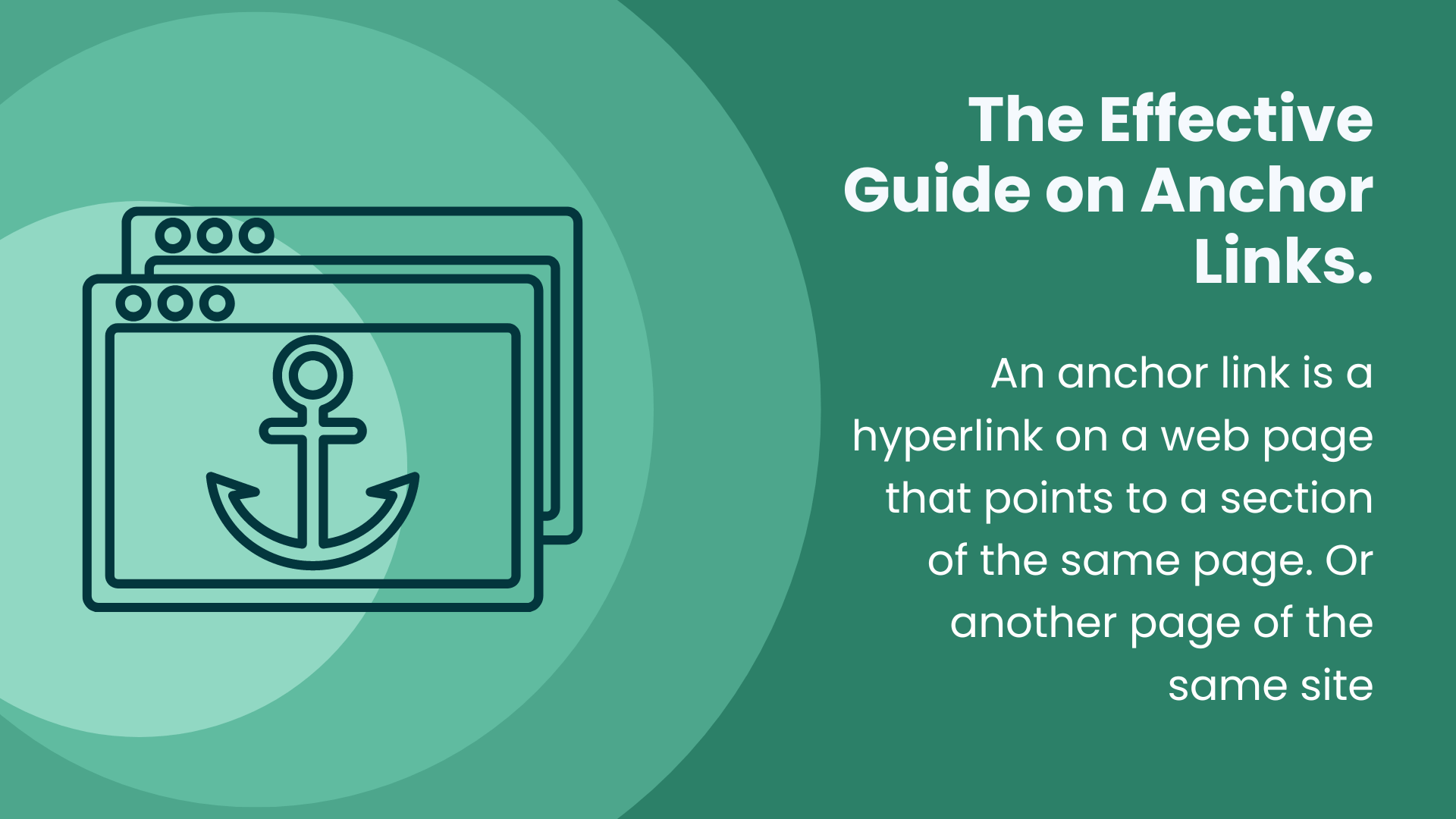If you are familiar with Search Engine Optimization, there are some terms that you need to easily familiarize yourself with. They can help you know how best to optimize your site for search engines, customer acquisition, and lead generation.
The SEO Glossary will help you learn more about them efficiently.
# - SEO Glossary Terms
2xx status codes – The server has sent a code to confirm that the request has been successfully processed.
301 Redirect – This is the process of permanently redirecting a webpage from one URL to another.
302 Redirect - This refers to momentarily redirecting a webpage from one URL to a different one.
4xx status codes - The server couldn't find the requested information, and the request was unsuccessful.
5xx status codes - The server's operation is experiencing an issue, as indicated by a code it transmitted.
A - SEO Glossary Terms
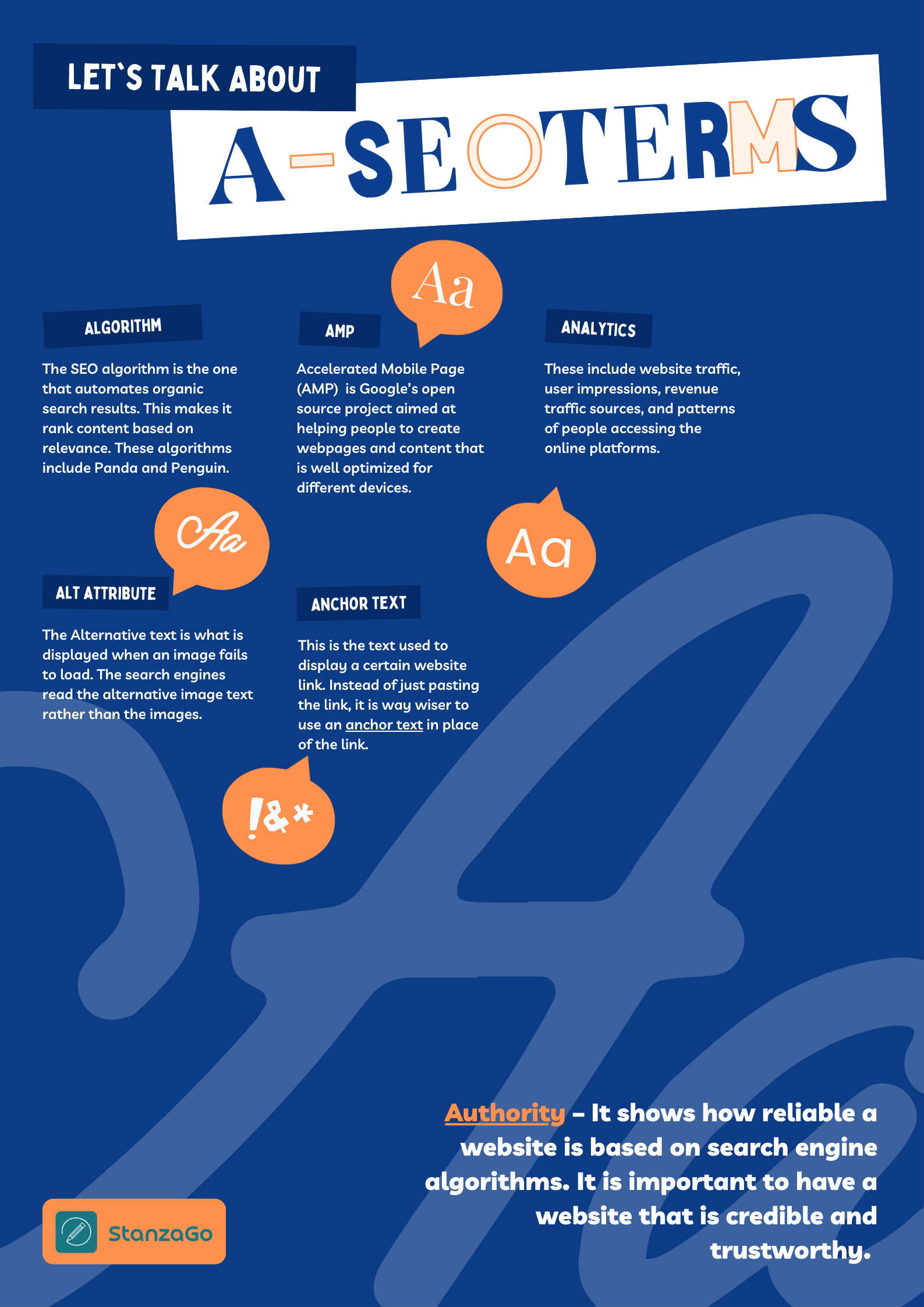
Accelerated Mobile Page (AMP) – This is Google’s open source project aimed at helping people to create webpages and content that is well optimized for different devices.
Alt attribute – The Alternative text is what is displayed when an image fails to load. The search engines read the alternative image text rather than the images. Therefore, if you use images in your websites, it is crucial to have an alternative text.
Algorithm – The SEO algorithm is the one that automates organic search results. This makes it rank content based on relevance. These algorithms include Panda and Penguin.
Analytics – These include website traffic, user impressions, revenue traffic sources, and patterns of people accessing the online platforms. Analytics help you to organize your website or app better.
Anchor text – This is the text used to display a certain website link. Instead of just pasting the link, it is way wiser to use an anchor text in place of the link. Hyperlinks often appear blue, but purple when visited. Through the anchor text, the search engine understands the destination of the link.
Authority – It shows how reliable a website is based on search engine algorithms. It is important to have a website that is credible and trustworthy.
B - SEO Glossary Terms
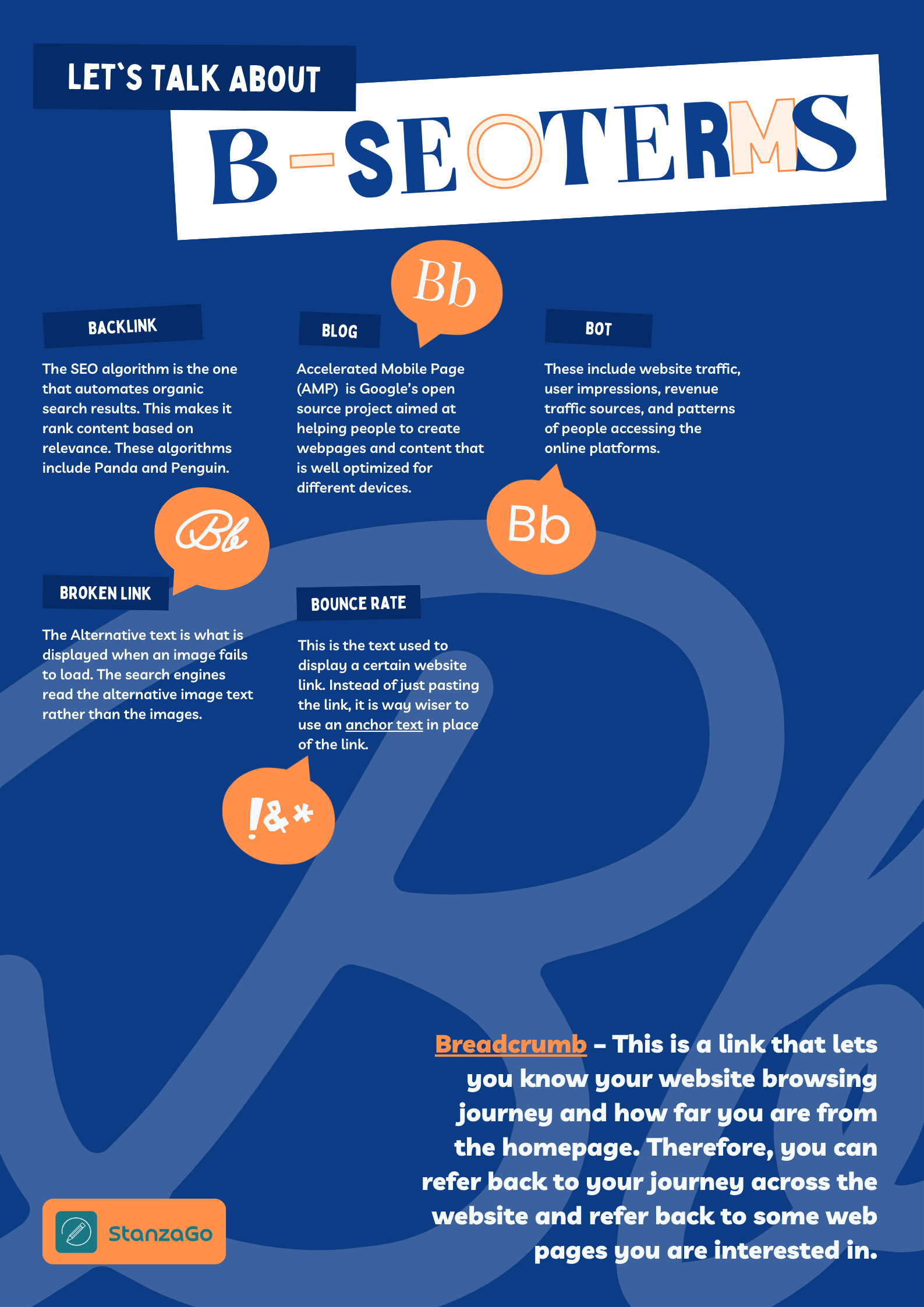
Backlink – These are the links that point back to an external webpage. Therefore, you can have backlinks on your website that point back to a specific important resource that can be beneficial to your audience. Backlinks also build great collaboration among website owners. It can also be termed an external link.
Black Hat – These are practices that go against Google’s webmaster guidelines. For example, hackers. In some cases, the term cloaking can be used to refer to when a piece of alternative information is displayed instead of the expected one on a website.
Blog – This is a website that contains blog posts relating to a specific topic or industry. A blog can have different authors who write on different topics of the same niche. They provide resources crucial to the target audience. In most cases, thorough research is done to produce original articles that are beneficial to the audience. Most people normally integrate blogs into their websites or online stores to attract the right audience to the website.
Bookmark – Bookmarks are often found on web browsers. Therefore, if you like a specific website or webpage, you can bookmark it for future reference. Therefore, you won't have to keep reminding yourself of what the webpage link was.
Bot – It is an application that completes certain tasks. For example, chatbots are used to answer people's queries on websites, and others are often automated to provide certain auto-generated responses that they had previously been fed.
Bounce Rate – The bounce rate explains the number of people who leave a website, just after seeing only one webpage. Therefore, you can estimate how effective your website is with the bounce rate. The more people leave without even doing a certain action, like clicking on another webpage, clicking a call-to-action button, or signing up, you can know something is wrong with your website.
Branded Keyword – The branded keywords are those that refer to a specific brand and no one can take ownership of it. They are specific to the specific company. For example, Coca Cola
Breadcrumb – This is a link that lets you know your website browsing journey and how far you are from the homepage. Therefore, you can refer back to your journey across the website and refer back to some web pages you are interested in.
Broken Link – This is a link that redirects to a 404 error page. This shows that the link has no destination. The link is not functional and therefore can't take a user to any valuable page. Broken links can easily make your website less reliable when people can't access some valuable pages.
Browser - These include Google Chrome, Safari, and Mozilla Firefox, which help you to access the internet and get hold of some important information.
C - SEO Glossary Terms
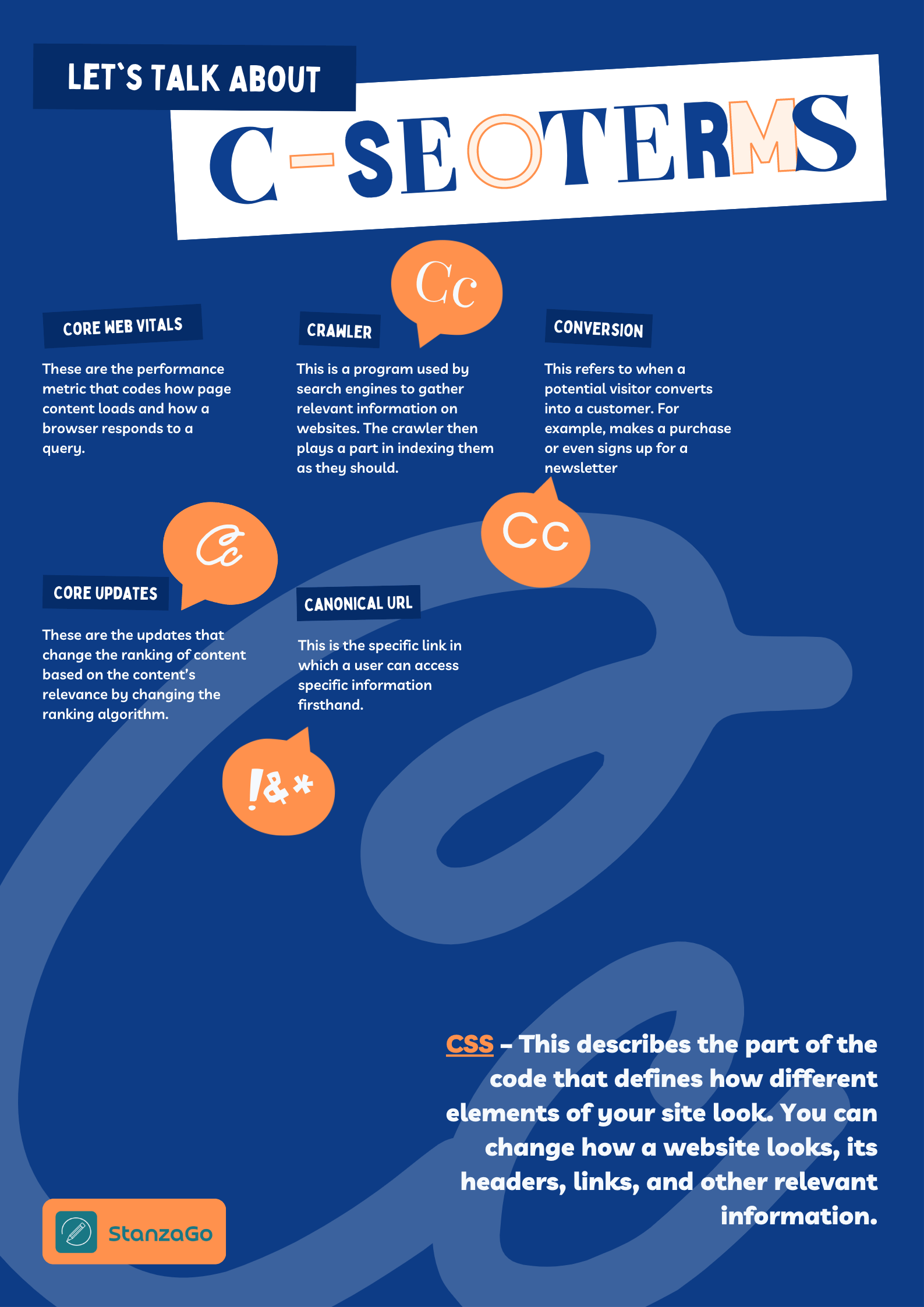
Cache – This is whereby temporary data is collected to make it easier to access certain websites, apps, and browsers. Therefore, when you attempt to open a certain page, it opens faster than you would have imagined. Therefore, people don't have to wait for too long before they can access your website or other online applications.
Canonical URL – This is the specific link in which a user can access specific information firsthand.
Citations – This is the reference or mention of a person or a business’s information online.
Click Bait – This is a marketing technique where webpages have links that are supposed to increase a page's click-through rate regardless of whether the content is valuable or not.
CMS – Content Management System – These are the applications that are used to create websites. They include WordPress, Magento, Joomla, Drupal, and much more.
Conversion – This refers to when a potential visitor converts into a customer. For example, makes a purchase or even signs up for a newsletter.
Conversion Form – This is the form that you can use to collect information about your site's visitors. For example, when you decide to have sign-up forms, you can capture your visitor's information, which can be crucial in building trust with them and converting visitors to potential customers.
Competitive Analysis – This is a research method that uses similar content or keywords from competitors to find relevant websites that will link to your content.
Core Updates – These are the updates that change the ranking of content based on the content's relevance by changing the ranking algorithm.
Core Web Vitals – These are the performance metric that codes how page content loads and how a browser responds to a query.
Crawler – This is a program used by search engines to gather relevant information on websites. The crawler then plays a part in indexing them as they should.
CSS – This describes the part of the code that defines how different elements of your site look. You can change how a website looks, its headers, links, and other relevant information. It is important to have a well-organized CSS that ensures your website outlook looks stunning.
D - SEO Glossary Terms
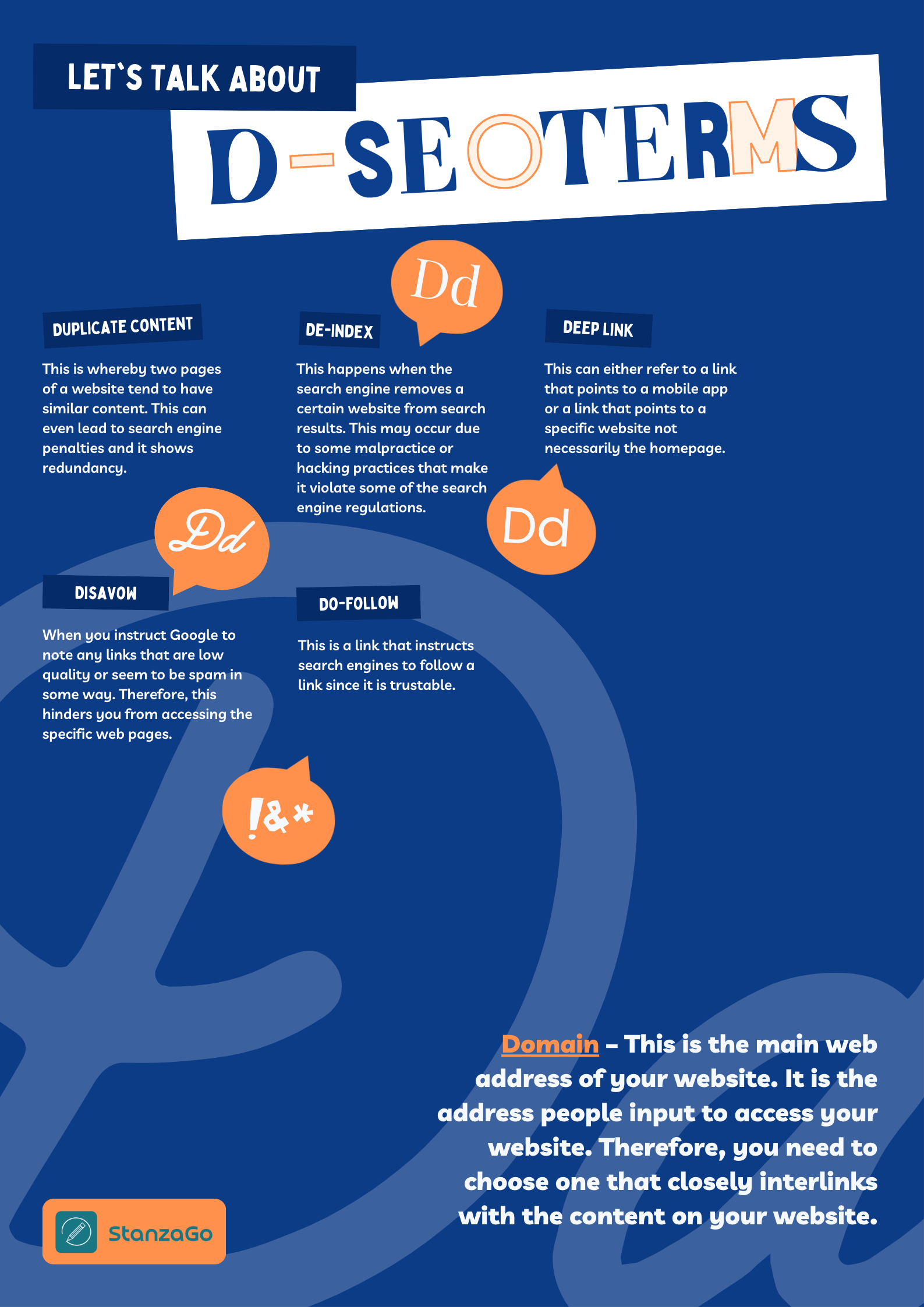
Deep link – This can either refer to a link that points to a mobile app or a link that points to a specific website, not necessarily the homepage.
De-Index – This happens when the search engine removes a certain website from search results. This may occur due to some malpractice or hacking practices that make it violate some of the search engine regulations.
Disavow – When you instruct Google to note any links that are low quality or seem to be spam in some way. Therefore, this hinders you from accessing the specific web pages.
Duplicate Content – This is whereby two pages of a website tend to have similar content. This can even lead to search engine penalties and it shows redundancy.
Do-follow – This is a link that instructs search engines to follow a link since it is trustworthy.
Domain – This is the main web address of your website. It is the address people input to access your website. Therefore, you need to choose one that closely interlinks with the content on your website. Memorable domain names make it easier for anyone to access your website.
E - SEO Glossary Terms
eCommerce SEO – The tactics are taken to ensure that an e-commerce website ranks well. Therefore, an online store is customized based on how best it can rank better.
Evergreen Content – An evergreen content is the type of content that always remains relevant even after a long time has passed.
F - SEO Glossary Terms
Featured Snippet – These are highlighted excerpts that appear at the top of Google search results. They tend to be more prioritized than other links.
Fold – The fold is the specific point on a website where a page gets cut off by the bottom of the user’s monitor or browser's window. Therefore, users have to scroll down to access certain crucial information. That’s why it is recommended to have important information above the fold. Therefore, website visitors can take the relevant action early enough.
G - SEO Glossary Terms
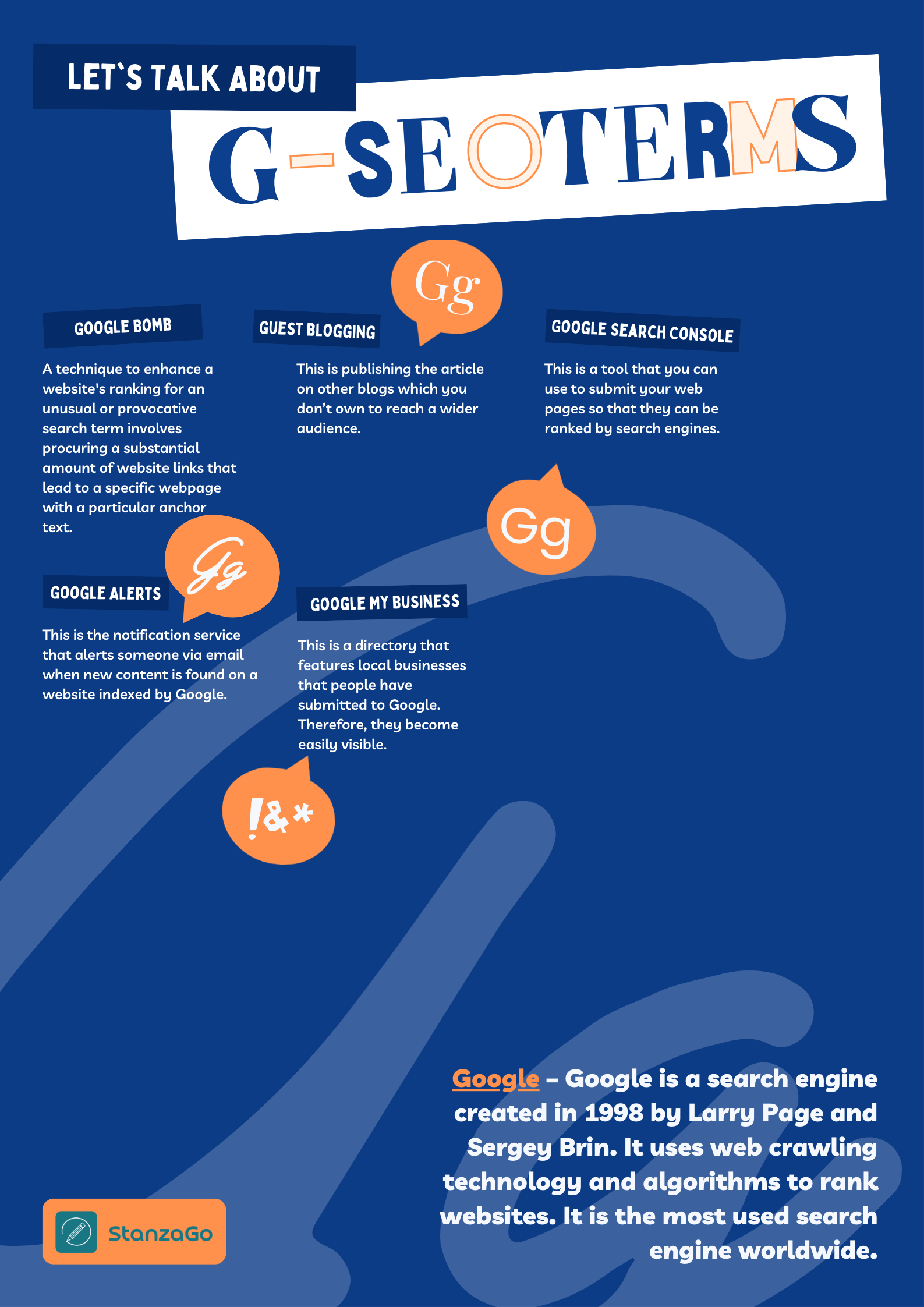
Google Alerts - This is the notification service that alerts someone via email when new content is found on a website indexed by Google.
Google My Business – This is a directory that features local businesses that people have submitted to Google. Therefore, they become easily visible.
Google Search Console – This is a tool that you can use to submit your web pages so that they can be ranked by search engines. It also allows easy crawling of the websites so that all the web pages can easily be seen. It makes it easy to monitor the progress of a website.
Guest Blogging – This is publishing an article on other blogs which you don't own to reach a wider audience.
H - SEO Glossary Terms
Header Tag – It is the code used to separate headings and subheadings from paragraphs. This makes it easier to know the important titles from the non-important ones. You can have different headings such as H1 or H₂. Therefore, during the crawling of the text, they tend to be given more preference than the other.
HTML – HyperText Markup Language is the code that the search engines read. It is important to keep the HTML clean for the search engines to easily read it.
I - SEO Glossary Terms
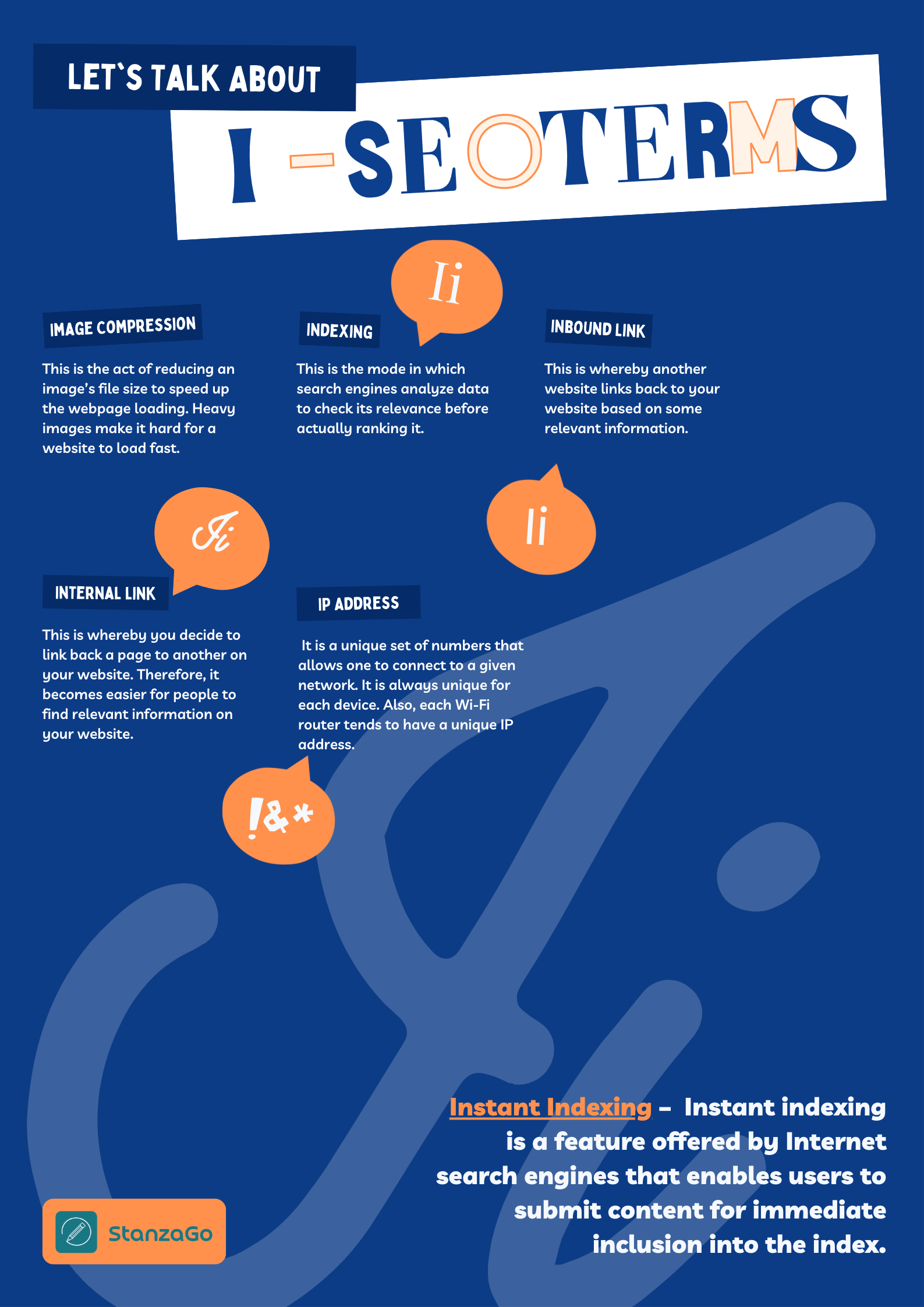
Image Compression – This is the act of reducing an image’s file size to speed up the webpage loading. Heavy images make it hard for a website to load fast.
Indexing – This is the mode in which search engines analyze data to check its relevance before actually ranking it. Therefore, if you provide relevant information, you are assured that it will rank high in search engines. In some cases, you may have indexed pages that you have submitted and therefore stored by search engines.
Inbound Link – This is whereby another website links back to your website based on some relevant information.
Internal Link – This is whereby you decide to link back a page to another on your website. Therefore, it becomes easier for people to find relevant information on your website.
IP Address – It is a unique set of numbers that allows one to connect to a given network. It is always unique for each device. Also, each Wi-Fi router tends to have a unique IP address.
J - SEO Glossary Terms
JS - JavaScript is great for adding dynamic content, links, and metadata when developing websites. However, relying heavily on JavaScript can cause problems for search engine bots and lead to slower loading times for users. It's crucial to remember these potential drawbacks when deciding how to use JavaScript on your site.
K - SEO Glossary Terms
Keywords – These are important words added to a website, blog post, or online store that make it easier for the platform to be searched and found. Therefore, keyword optimization makes it easier for the target audience to get information fast and locate your website. You can have specific keywords.
Keyword Research – This is the process of searching for keywords that you can use on your website. Therefore, it becomes much easier for your website to be seen by search engines.
Keyword Stuffing – The practice of overusing keywords in your content. However, instead of the keywords helping you, they become a nuisance and can even lead to your website being penalized.
L - SEO Glossary Terms
Landing Page – A landing page tends to target a specific keyword and has a call to action button that requires users to perform a certain action.
Link Building – The process of acquiring inbound links in which many external websites link back to your website for better search engine ranking.
Long Tail Keyword – These are the specific queries that include more than three words.
M - SEO Glossary Terms
Machine Learning – Through ML, it becomes easier for SEO to understand a user’s intention behind a query.
Metadata – This is crucial information that tells search engines what the website is about.
Meta Description –This is a short description of what a webpage or web post is all about. It is meant to make users curious and want to read more about the page.
Metric – These are the standards of measurement used in SEO.
N, O - SEO Glossary Terms
Negative SEO – These are the tactics that can be used to lower a competitor's ranking in search results.
Off-page SEO – These are the external strategies implemented externally to make a website rank better.
On-Page SEO – These are the factors controlled on your website to make it rank better.
Organic Traffic – This is how visitors discover your website on the search engine ranking pages due to your valuable content. It's like they get attracted to your website without you having to make any advertisements at all.
Outreach – it is a link-building tactic done to gain organic backlinks to other websites by sending emails.
P - SEO Glossary Terms
Page Title – This is the name given to a web page. The page title should contain keywords that relate to what the website is all about. It can also help your website to have a good page rank, in which the search engines see your website as really valuable.
Pay Per Click – This is the advertisement mode in which website owners pay their affiliates or platforms when visitors click on their ads and continue with the relevant action. It is a sort of affiliate marketing, but this mainly deals with pay-per-click.
Q, R - SEO Glossary Terms
Query – These are the words that you type into the search engine to go to a certain page. Therefore, you can make various queries so that you can know the results you can get from a certain query and even find relevant keywords that you can use.
Rank Brain – It is part of Google’s algorithm that understands the set queries to deliver the best results.
Ranking Factors – These are factors that influence a website’s ranking on search engines. If it has valuable information, it will rank higher, if not, it won’t rank higher.
Responsive Design – This is the flexibility of the website to adapt to any device. For example, a mobile phone, tablet, or any other device. Therefore, the website needs to be responsive enough to make it easier for users to use it.
Robots.txt – A text file that tells the search engine crawlers which parts of the website are accessible and the non-accessible ones.
S - SEO Glossary Terms
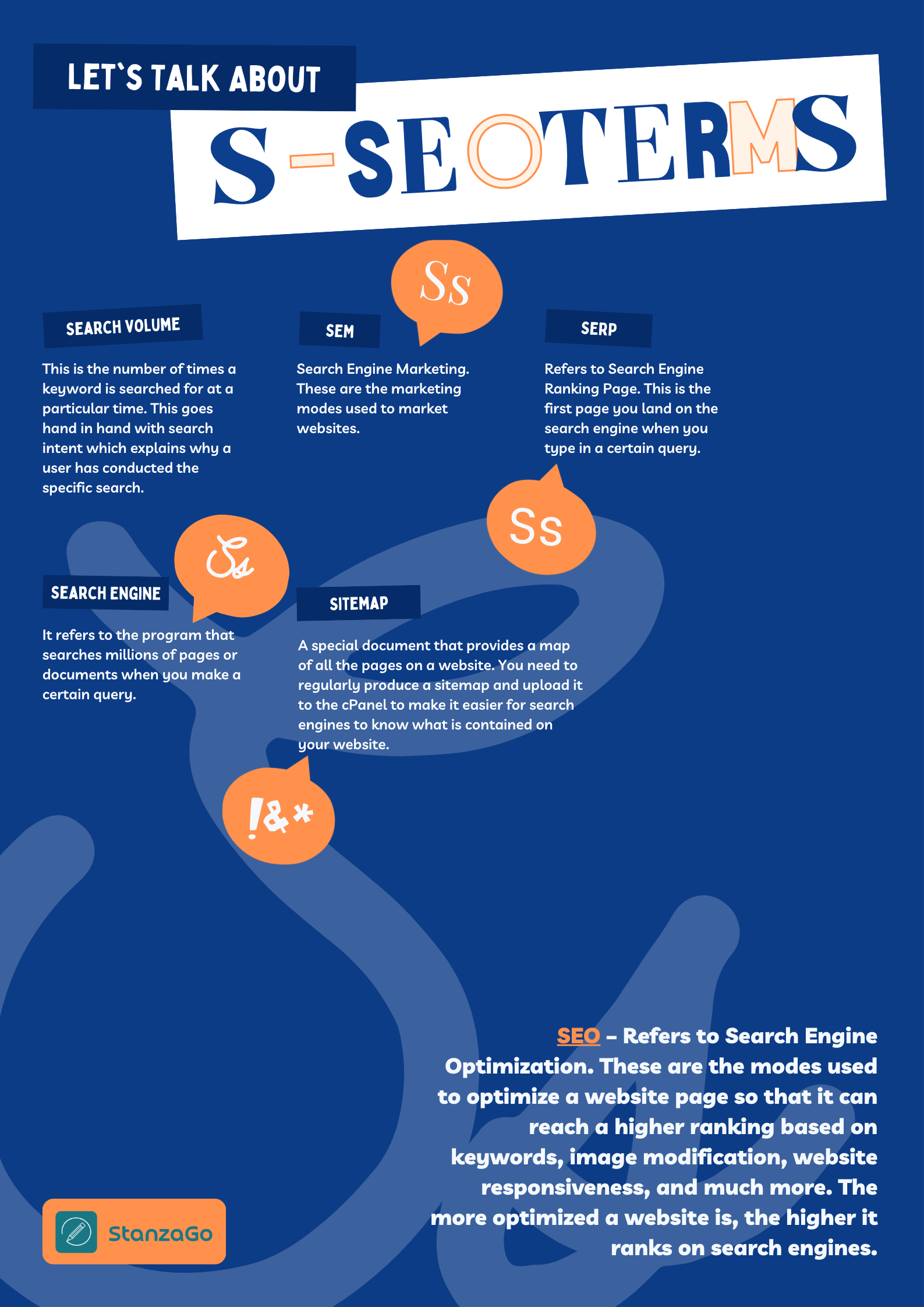
Search Volume – This is the number of times a keyword is searched for at a particular time. This goes hand in hand with search intent, which explains why a user has conducted the specific search.
Seasonal Trends – This is the increase and decrease of the search of certain keywords. For example, World Cup when it is a specific season.
SEO – Refers to Search Engine Optimization. These are the modes used to optimize a website page so that it can reach a higher ranking based on keywords, image modification, website responsiveness, and much more. The more optimized a website is, the higher it ranks on search engines.
Search Engine – It refers to the program that searches millions of pages or documents when you make a certain query.
SEM – Search Engine Marketing. These are the marketing modes used to market websites.
SERP – Refers to Search Engine Ranking Page. This is the first page you land on the search engine when you type in a certain query. In most cases, you get 10 results based on the query and the first page tends to contain the most relevant information.
Sitemap – A special document that provides a map of all the pages on a website. You need to regularly produce a sitemap and upload it to the cPanel to make it easier for search engines to know what is contained on your website. It helps in search engine ranking.
SSL Certificate – It is used to encrypt data that passes between a web server and a browser. An SSL certificate ensures that no hackers can get access to it. Therefore, it is important to always have an SSL Certificate to ensure that no hackers can gain access without any authorization.
Structured Data – This is data that helps search engines understand certain information.
T - SEO Glossary Terms
Traffic – This is the number of visits your website gets. There is also traffic rank, which refers to how much traffic your site gets compared to other sites.
Toxic Links – These are harmful links that affect the search rankings of a website.
U - SEO Glossary Terms
Unlinked Mentions – These are the brand mentions that don’t link back to your website.
Unnatural Links – These are the artificial links that are used to manipulate search results.
URL – This refers to the web address of a webpage on your site. They tend to be unique and can never be the same, or there will be an error.
User Experience – This is the feeling users get when they interact with a product, service, or website. This determines whether they will be ready to interact with it again or not.
Usability – This refers to a user-centered design that makes it easy for a website to be used.
V, W, X, Y, Z - SEO Glossary Terms
Vertical search – This makes the search engines focus on a specific area of content only.
White Hat – These are the SEO tactics that don’t manipulate the search engines in any way.
Website Navigation – The elements on a page that make it easy to access various web pages on a website.
XML – This is the eXtensible markup language that helps search engines understand website data. The XML sitemap is a file that lists the website’s important pages so that search engines can easily find and crawl them. There are certain XML sitemap generators that you can use.
Yahoo - Yahoo started as a popular search engine and portal in 1994. Initially, human power drove its search results. In 2004, Yahoo developed its own search technology, but since 2010, it has relied on Bing to power its organic search results.
Yandex - As of today, Yandex stands as the leading search engine in Russia, having been established on September 23, 1997, by Arkady Volozh and Ilya Segalovich.
Yoast SEO - If you're using WordPress as your CMS, then you'd probably meet eye-to-eye with Yoast SEO. It's a search engine optimization plugin for WordPress that allows you to ensure your website's on-page and technical SEO.
Zero Click Search – This is the top search result in a query that answers your query without necessarily going to a specific website.
Boost Your Ranking Through SEO
Search Engine Optimization is crucial for any business. By understanding these terms, you will be in a better position to know how to improve your website, app, or online platform for better visibility.
Use the right strategies for your website!




